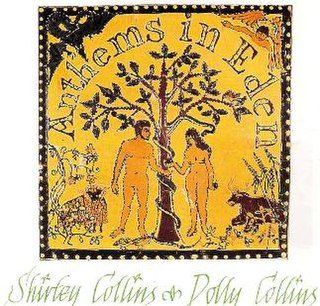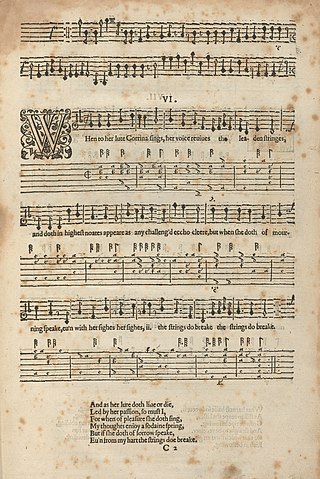Related Research Articles

The viol, viola da gamba, or informally gamba, is any one of a family of bowed, fretted, and stringed instruments with hollow wooden bodies and pegboxes where the tension on the strings can be increased or decreased to adjust the pitch of each of the strings. Frets on the viol are usually made of gut, tied on the fingerboard around the instrument's neck, to enable the performer to stop the strings more cleanly. Frets improve consistency of intonation and lend the stopped notes a tone that better matches the open strings. Viols first appeared in Spain and Italy in the mid-to-late 15th century, and were most popular in the Renaissance and Baroque (1600–1750) periods. Early ancestors include the Arabic rebab and the medieval European vielle, but later, more direct possible ancestors include the Venetian viole and the 15th- and 16th-century Spanish vihuela, a six-course plucked instrument tuned like a lute that looked like but was quite distinct from the four-course guitar.

Michael Laurence Nyman, CBE is an English composer, pianist, librettist, musicologist, and filmmaker. He is known for numerous film scores, and his multi-platinum soundtrack album to Jane Campion's The Piano. He has written a number of operas, including The Man Who Mistook His Wife for a Hat; Letters, Riddles and Writs; Noises, Sounds & Sweet Airs; Facing Goya; Man and Boy: Dada; Love Counts; and Sparkie: Cage and Beyond. He has written six concerti, five string quartets, and many other chamber works, many for his Michael Nyman Band. He is also a performing pianist. Nyman prefers to write opera over other forms of music.

William Lawes was an English composer and musician.
Custer LaRue is an American soprano vocalist of the late 20th and early 21st centuries. She specializes in Renaissance music and traditional folk music such as the Child ballads and music collected in Appalachia during the early 20th century.
The City Waites is a British early music ensemble. Formed in the early 1970s, they specialise in English music of the 16th and 17th centuries from the street, tavern, theatre and countryside — the music of ordinary people. They endeavour to appeal to a wide general audience as well as to scholars. They have toured the UK, much of Europe, the Middle East, the Far East and the USA, performing everywhere from major concert halls and universities to village squares. Collaborations include the National Theatre, the Royal Shakespeare Company and Shakespeare's Globe. They can be heard on several movie and TV soundtracks; they broadcast frequently and have made more than 30 CDs.
Hille Perl is a German virtuoso performer of the viola da gamba and lirone.

Anthems in Eden is a 1969 album by Shirley and Dolly Collins, with the Early Music Consort of London, directed by David Munrow. The album originally consisted of a 28-minute set of folk songs plus seven other individual pieces performed by the same group. The musical arrangements for these eight pieces included early music instruments, such as viols, recorders, sackbuts and crumhorns. In 1976, six new songs were recorded with a different assortment of accompanists, to replace the original seven individual songs. This 1976 album consisting of the 28-minute set plus the six new songs was released by Harvest Records under the title Amaranth. Subsequent releases have combined all fourteen pieces under the original title, Anthems in Eden.

During the reign of Queen Elizabeth I (1558–1603), English art and high culture reached a pinnacle known as the height of the English Renaissance. Elizabethan music experienced a shift in popularity from sacred to secular music and the rise of instrumental music. Professional musicians were employed by the Church of England, the nobility, and the rising middle-class.

Le Poème Harmonique is a musical ensemble founded in 1998 by Vincent Dumestre to recreate and promote early music, in particular that of the 17th century. Using rare instruments such as the theorbo, the lirone, the tiorbino and the arpa tripla, Le Poème Harmonique aims to recapture the poetry of early music, particularly of the late renaissance and early baroque era. The early 17th-century French and Italian madrigal is a special interest. Le Poème Harmonique also teaches singers in collaboration with the Centre de Musique Baroque at Versailles. The group's recordings with the French Alpha record label of Jean-Paul Combet contributed to the critical and commercial establishment of the label, and included the 1st and 100th releases of the label's primary 'Ut Pictura Musica' series.

In English early Baroque music, a broken consort is an ensemble featuring instruments from more than one family, for example a group featuring both string and wind instruments. A consort consisting entirely of instruments of the same family, on the other hand, was referred to as a "whole consort", though this expression is not found until well into the seventeenth century. The word "consort", used in this way, is an earlier form of "concert", according to one opinion, while other sources hold the reverse: that it comes from the French term concert or its Italian parent term concerto, in its sixteenth-century sense. Matthew Locke published pieces for whole and broken consorts of two to six parts as late as 1672.

Philip Rosseter was an English composer and musician, as well as a theatrical manager. His family seems to have been from Somerset or Lincolnshire, he may have been employed with the Countess of Sussex by 1596, and he was living in London by 1598. In 1604 Rosseter was appointed a court lutenist for James I of England, a position he held until his death in 1623. Rosseter is best known for A Book of Ayres which was written with Thomas Campion and published in 1601. Some literary critics have held that Campion wrote the poems for Rosseter's songs; however, this seems not to be the case. It is likely that Campion was the author of the book's preface, which criticizes complex counterpoint and "intricate" harmonies that leave the words inaudible. The two men had a close professional and personal relationship; when Campion died in 1620, he had named Rosseter his sole heir.
The Harp Consort is an international early music ensemble directed by Andrew Lawrence-King, specialising in Baroque opera, early dance-music, and historical World Music.
Ensemble Renaissance is the first early music ensemble in Serbia and the second in south-eastern Europe, having been founded in 1968. Ensemble Renaissance usually focuses on the music of the Middle Ages, Renaissance and Baroque. Occasionally, however, Ensemble performs modern music on ancient instruments.

Lucie Skeaping is a British singer, instrumentalist, broadcaster and writer. She was a founder of the early music group the City Waites and the pioneering klezmer band the Burning Bush. She presents BBC Radio 3's Early Music Show, a weekly programme dedicated to the early music repertoire.
Ronn McFarlane is an American lutenist and composer, most notable as an interpreter of Renaissance music. He formerly taught lute at the Peabody Conservatory, and has recorded many albums as a solo performer and in collaboration with others, including the groups Ayreheart and The Baltimore Consort, and as a guest artist for countless other groups. He resides in Portland, Oregon, and continues to perform and compose to this day.
Roger Harmon is an American musicologist and lutenist who taught lute at the Peabody Conservatory in Baltimore, Maryland. He is noted for founding the Baltimore Consort in 1980 with flutist Mindy Rosenfeld, which performed successfully for several years before releasing On the Banks of the Helicon, their first album for Dorian Recordings. Roger Harmon's research has focused mainly on ancient music theory.
Mindy Rosenfeld is an American flutist, piper and harpist, noted as a founding member of the Baltimore Consort, specializing in Renaissance music. She is also credited as Mindy Rosenfeld Hedges.
Martin Best is an English singer, lutenist, guitarist, and composer. Best has been active mainly in early music including Renaissance music, minstrel songs and the French troubadour traditions, in works related to Shakespeare, such as the sonnets and music to Shakespeare plays, and also in songs of the Swedish ballad tradition. He has often performed in constellations named Martin Best Consort and Martin Best Medieval Ensemble.
The Willow song is an anonymous Elizabethan or earlier folk song used in the penultimate act of Shakespeare's Othello. The earliest record of the Willow song is in a book of lute music from 1583, while Shakespeare's play was not written until 20 years later in 1604. The song in Shakespeare's play is sung by Desdemona, Othello's wife, when she has begun to fear her jealous husband.

Judith Davidoff was an American viol player, cellist, and performer on the medieval bowed instruments. She was considered the “Grande Dame of the viol”, "a master of the viola da gamba and other stringed instruments" and "a central part of the early-music scene." Her recorded performances reflect her wide range of repertoire and styles, including such works as Schoenberg's Verklaerte Nacht and 13th-century monody. She is responsible for the catalog of 20th- and 21st-century viol music.
References
- ↑ "Billboard". 108 (13). 1996: 81.
{{cite journal}}: Cite journal requires|journal=(help) - ↑ "Baltimore Consort". AllMusic . Retrieved 28 December 2011.
- ↑ "Recordings" . Retrieved 28 December 2011.